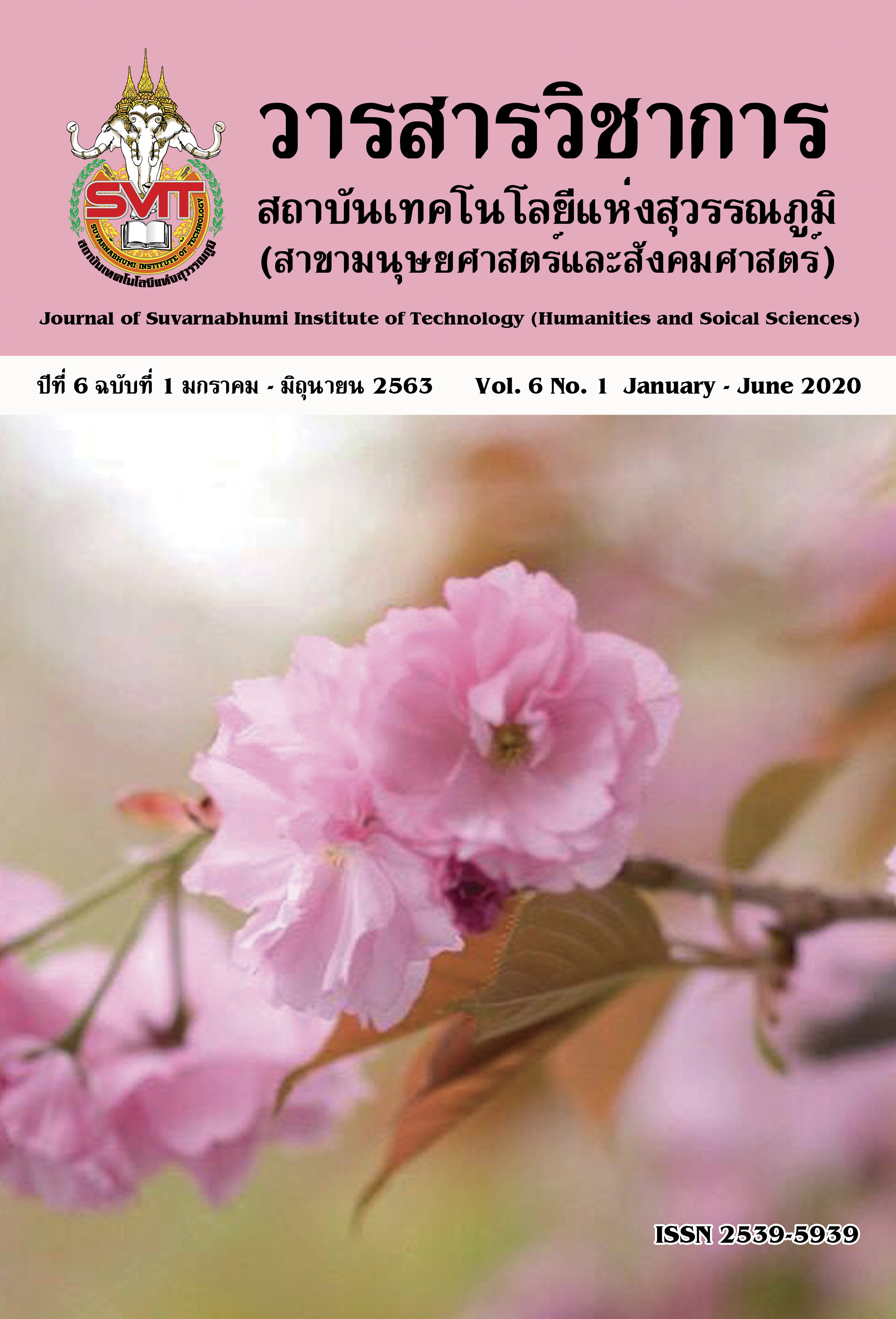GUIDELINES FOR PREPARATION OF POTENTIAL DEVELOPMENT OF VOCATIONAL STUDENTS ALONG THE BORDER TO BECOME THE SUPERVISORS OF FOREIGN WORKERS IN THE INDUSTRIAL SECTOR OF THAILAND
Keywords:
Potential development, Vocational students, Supervisor, Alienate worker, BorderAbstract
This research aims to study the gap between the needs of Thai industrial organizations that use neighboring languages and the skills of vocational students in the border region of Thailand and to find guidelines for preparing work readiness and create career opportunities for bilingual students to be able to work as a supervisor in the industrial sector in Thailand. The researcher uses a qualitative research mothodology by conducting in-depth interviews from 10 Ministry of education representatives in technical colleges and vocational institutions along the border, 10 business owners or senior executives in industrial factories that employed foreign workers and 10 supervisors of Thai industrial. In the quantitative research methodology, the researcher collected 400 supervisors in industrial factories by using questionnaires and 400 vocational students in vocational certificate level 2.
The results showed the gap between the needs of Thai industrial organizations that use neighboring languages and skills of vocational students in the border region of Thailand are as follows 1) Solving problems caused by foreign workers in Thailand. 2) Leadership level. 3) Leadership characteristics. 4) Work readiness guidelines. 5) Resolving conflicts between supervisors and foreign workers. 6) Characteristics of supervisors. 7) Public policy and career channels.
Guidelines for preparing work readiness and creating a career opportunities for vocational students who speak bilinguage are as follows 1) Physical aspects by promoting policies and organizing annual health insurance activities and sufficient medical personnel support. 2) Intellectual, promoting systematic thinking processes and improving curriculum to promote leadership, specific skills and knowledge of neighboring languages. 3) Environmental, creating an atmosphere of learning and career guidance. 4) Emotional, motivation and personality, supporting experts in providing knowledge about emotional control and creating good personality and 5) Communication, providing training to provide basic knowledge of neighboring languages that are necessary for the job including the development of neighboring language courses in vocational education institutions.
References
กรมการจัดหางาน. (2563). ยุทธศาสตร์การบริหารจัดการแรงงานต่างด้าว พ.ศ. 2560 – 2565. กรุงเทพฯ: กรมการจัดหางาน.
กระทรวงศึกษาธิการ. (2559). แผนปฏิบัติราชการ ประจำปีงบประมาณ พ.ศ.2560 ของกระทรวงศึกษาธิการ (เพื่อประกอบการจัดทำคำของบประมาณรายจ่ายประจำปี พ.ศ.2560). กรุงเทพฯ: สำนักนโยบายและยุทธศาสตร์ สำนักปลัดกระทรวง กระทรวงศึกษาธิการ.
โกสุมภ์ สายจันทร์. (2554). บทสังเคราะห์ชุดโครงการวิจัยเรื่อง สถานะและปัญหาของทายาทรุ่นที่ 2 ของผู้
ย้ายถิ่นจากประเทศพม่า. เชียงใหม่: มหาวิทยาลัยเชียงใหม่.
สุวิไล เปรมศรีรัตน์. (2550). แนวทางการอนุรักษ์และสืบสานวัฒนธรรมทางภาษา : การสร้างระบบเขียนสำหรับภาษาชาติพันธ์ในประเทศไทย. นครปฐม: สถาบันวิจัยภาษาและวัฒนธรรมเพื่อพัฒนาชนบท มหาวิทยาลัยมหิดล.
เสาวณี จันทะพงษ์. (2554). สภาวการณ์การขาดแคลนแรงงานและพฤติกรรมการเคลื่อนย้ายแรงงานของไทย: ผลจากการสำรวจการจ้างงานปี 2554. กรุงเทพฯ: ฝ่ายวิจัยเศรษฐกิจ สายนโยบายการเงิน ธนาคารแห่งประเทศไทย.
อุดม วงศ์วิวัฒน์ไชย. (2558). เจาะลึกแรงงานอุตสาหกรรมไทยและความต้องการ 5 ปีข้างหน้า. สืบค้นเมื่อ 10 กุมภาพันธ์ 2562 จาก http://wwww.industry.go.th
Allen, L. M. (2010). A Critique of Four Grounded Theory Texts. The Qualitative Report, 15(6),
-1620.
Azita et al. (2012). The Effectiveness of Problem - Based Learning Methods in Improving High-
Order Thinking Skills. Journal of Physics: Conference Series, 1150, 1-11.
Bakic-Miric, N. (2008). Successful Doctor-Patient Communication and Rapport building as key skills of Medical Practice. Medicine and Biology, 15(2), 74-79.
Bass, B. M. (1990). From transactional to transformational leadership: Learning to share the vision. Organizational Dynamics, 18(3), 19-31.
Bass, B.M. and Avolio, B.J. (1994). Full range leadership development-Manual for the multifactor leadership questionnaire. Redwood City, CA: Mind Garden.
Bovee, L. C. (1993). Management. New York: McGraw-Hill.
Daft, R. L. (1994). Management, 3rd ed. Fort Worth: The Dryden Press.
Dahl, R. A. (2005). What Political Institutions Does Large-Scale Democracy Require?. Political Science Quarterly, 120(2), 187–197.
Downing, J., & Thackray, D. (1971). Reading readiness. London: University of LondonPress.
Gardner. J. W. (1989). On leadership. New York: Free Press.
Hoy, W.K. and, Miskel, C.G. (1991). Educational Administration: Theory - Research – Practice.
Singapore: McGraw – Hill, Inc.
Inoue, K. (2007). Flood disaster in Japan. J. Disaster Res., 2, 3-10.
Jacobs, T.O. & Elliott, Jaques. (1990). Military Executive Leadership. Measures of Leadership. Greenboro: Center for Creative Leadership.
Jiang, H. (2006). Trends in anthropogenic mercury emissions in China from 1995 to 2003. Environmental Science and Technology, 40(17): 5312–5318.
Lindgrend, E. (1962). Editorial. SAGE Journals, 57(1), 1-2.
Loosemore, M., and Andonakis, N. (2007). Barriers to implementing OHS reforms – the experiences of small subcontractors in the Australian construction industry. International Journal of Project Management, 25, 579-588.
Rosabeth, M. K. (1995). World Class. New York: Simon & Schuster.
Schroder, H.M. (1995). Managerial Competence: The Key to Excellence - A new strategy for Management development in the information age. Iowa. Im: Kendall/Hunt Publishing Company.
Sergiovanni, T. J., and Moore, J. H. (1989). Schooling for tomorrow. Boston: Allyn and Bacon.
Trewatha, R. L., and Newport, G. M. (1982). Management. (3rd ed.). Plano, TX: Business.
Downloads
Published
Issue
Section
License
Copyright (c) 2020 Suvarnabhumi Institute of Technology

This work is licensed under a Creative Commons Attribution-NonCommercial-NoDerivatives 4.0 International License.
The articles published are copyrighted by the Sarasas Journal of Humanities and Social Science. The opinions expressed in each article in this academic journal are those of the individual authors and do not reflect the views of Sarasas Suvarnabhumi Institute of Technology. The authors are solely responsible for all aspects of their respective articles. Any errors or inaccuracies in the articles are the sole responsibility of the authors.



